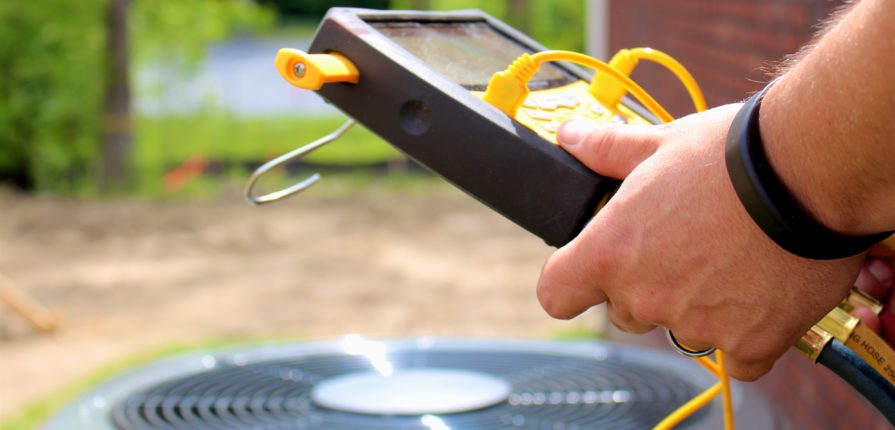Let’s be honest – there’s little chance you would tolerate the Tampa summers without cool air blasting through your home.
Even though most have the luxury of flipping a switch to change the indoor air temperature, it’s common for homeowners (and even builders) to confuse the two main systems used for cooling: HVAC units and air conditioners. You may even be guilty of throwing around the acronyms HVAC and AC, thinking they mean the same thing.
We’re here to explain the differences and clear up any confusion.
An HVAC system has several functions, such as heating and cooling. But an AC unit only cools your home.
If you’re interested in knowing more about the differences between HVAC vs AC, continue reading.
What Is an HVAC Unit?
HVAC stands for:
- Heating (H)
- Ventilation (V)
- Air Conditioning (AC)
HVAC refers to ventilation which includes kitchen exhaust, dryer exhaust, bath exhausts, and commercial ventilation. While heating and cooling are essential functions of your HVAC system, it also provides ventilation, which allows moisture to escape. This is especially important for hot, humid climates (like Tampa) because humid heat can be more dangerous for your health than dry heat.
An HVAC unit includes the following components:
- Air conditioning unit
- Furnace
- Air ducts and other ductwork
So while sometimes the acronym HVAC can refer to an air conditioning unit, not all AC units are HVAC units.
Let’s explore the components of an HVAC system further.
Heat Pumps
Heat pumps exchange warm air with cool air. There are two varieties to choose from.
The first is an air-source heat pump, which is typical for residential HVAC systems. These pumps are installed outside your home. They pull warm air, or heat, from the outside air and transfer it to your home.
The second type of heat pump is a ground-source or geothermal heat pump. They transfer heat between the ground and the air inside your home.
Although geothermal heat pumps have better energy efficiency and lower operating expenses, they are costly to install.
In the summer months, heat pumps pull warm air out from the inside of your home to cool the space.
Furnace
The furnace is the heating component of your HVAC unit. But don’t confuse furnaces with central heating.
While furnaces may be part of a central heating system, this isn’t always the case. Central heating systems require a heat source, and furnaces are the most common heating option.
Furnaces generate and distribute warm or hot air throughout your home. You can power your furnace with a variety of energy sources, including
- Electricity
- Natural gas
- Oil
- Propane
Gas furnaces are the most common, as nearly half of the homes in the U.S. use them. They are also highly economical.
In addition, there are several types of furnaces, including
- Natural-draft
- Forced-air
- Induced-draft
- Condensing
Older homes may even have a boiler system, which distributes heat by pumping hot water through small pipes.
Condensing furnaces are the most common today. They incorporate forced-air technology for better energy efficiency.
Ductless Systems
Although many HVAC systems use ductwork to distribute warm and cool air, installing a ductless system is possible too.
A ductless split system uses small air handlers to heat or cool a specific space. They are ideal for an individual room, such as a garage or sunroom, but not an entire house.
What Is an AC Unit?
An air conditioning system, or AC unit, cools your home. However, some builders may call anything that conditions the air (hot or cold) an AC unit, causing further confusion. To keep it straight in your mind, remember that an AC unit is a cooling system.
There are two basic types of air conditioners: window units and central AC. You may use a window AC unit to cool a single room since it’s less powerful than central air. The window AC installation process is also easier and takes less time than installing a central system.
Central Air Conditioning
A central air conditioner uses forced air to cool your home, and circulates cool air throughout your home using a system of air ducts. It’s a closed loop of refrigerants and cycled air. The condenser, compressor, and evaporator coils work in a loop to cycle the refrigerant.
The supply ducts and registers carry cool air from the AC unit to the home. Registers are openings covered by grills in the:
- Ceilings
- Floors
- Walls
As the air warms, it flows back to the central air conditioning unit through the return ducts and registers.
Because central air uses a system, it can be easy to confuse with your HVAC system. However, to keep central AC vs HVAC separate, remember that central air refers only to your cooling system and is different from your furnace.
Central air conditioners come in two styles: a split-system unit or a packaged unit.
HVAC vs. AC: Know the Difference
Now that you better understand what an HVAC system and AC unit are, let’s summarize your knowledge by looking at their components and functional differences.
Component Differences
To simplify the component differences of the AC unit vss HVAC system, think of it this way; your HVAC is the entire system, whereas your AC is just your air conditioner.
It can be confusing because sometimes people use the term HVAC when they mean to say furnace or heat pump.
For example, if you already have an air conditioner, you don’t need an entirely new HVAC system. Instead, you only need to add the heating components to complete your HVAC system, so it provides both heating and cooling.
Functional Differences
The functional differences between AC v. HVAC are straightforward. Your AC system regulates the air inside the home. It can radiate hot air from the house, but it also uses a condenser to cool hot air from outside.
Conversely, your HVAC system is a piece of comprehensive equipment that can perform several tasks. While it can include your AC unit, when you say HVAC, you reference the system as a whole.
Tampa HVAC Experts
In the Tampa weather, you may think you don’t need an HVAC system, and that an AC unit will suffice. But leaving all that moisture in your home can make you feel muggy and wet.
When considering an HVAC vs AC unit, we suggest going for an HVAC system.
Contact us at 3H AC and schedule an appointment today for all your HVAC needs. With more than 46 years of experience, we’ll offer you the highest quality HVAC services and equipment in the Tampa area.


